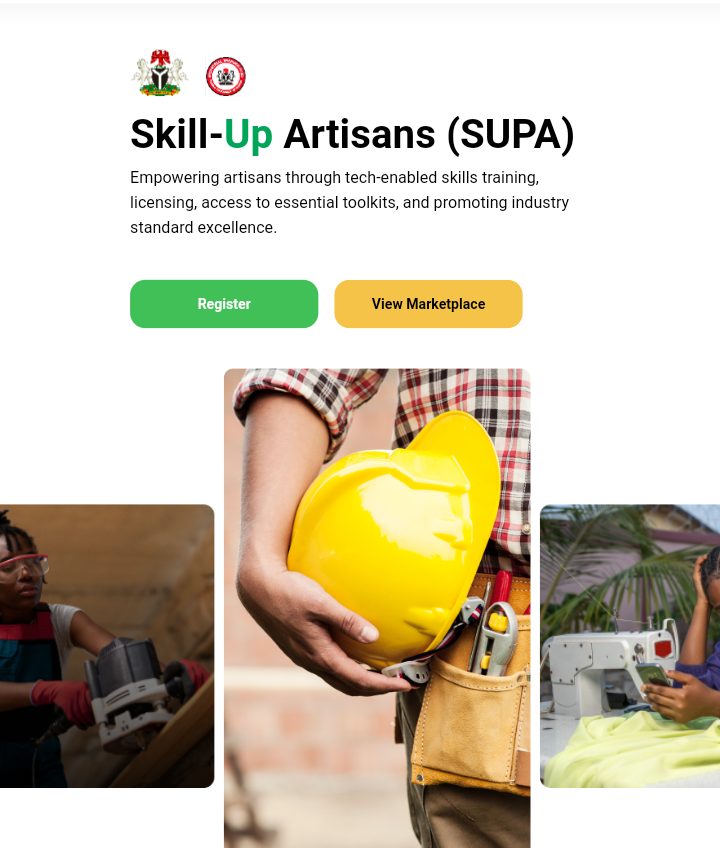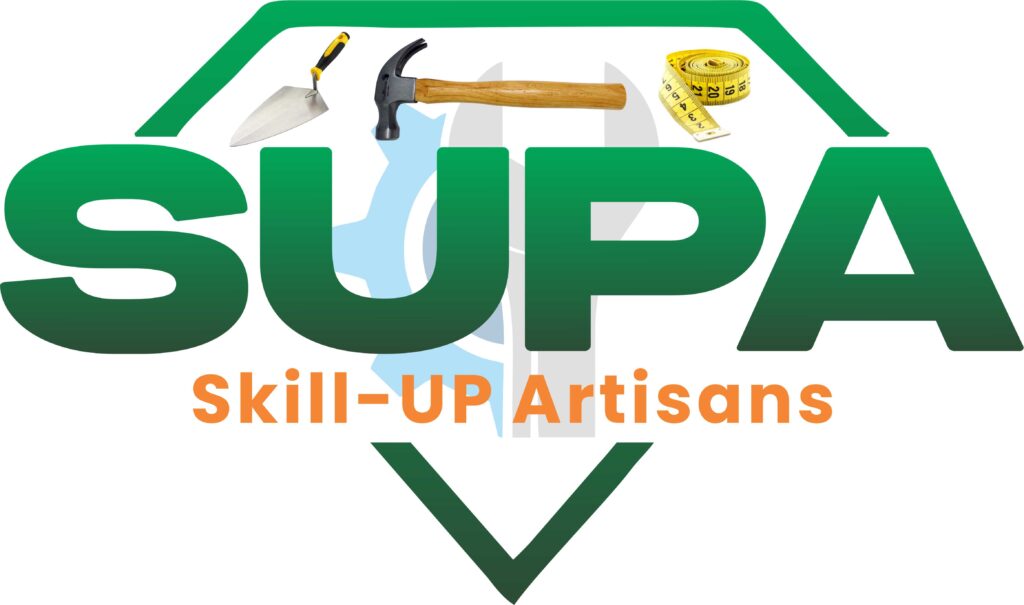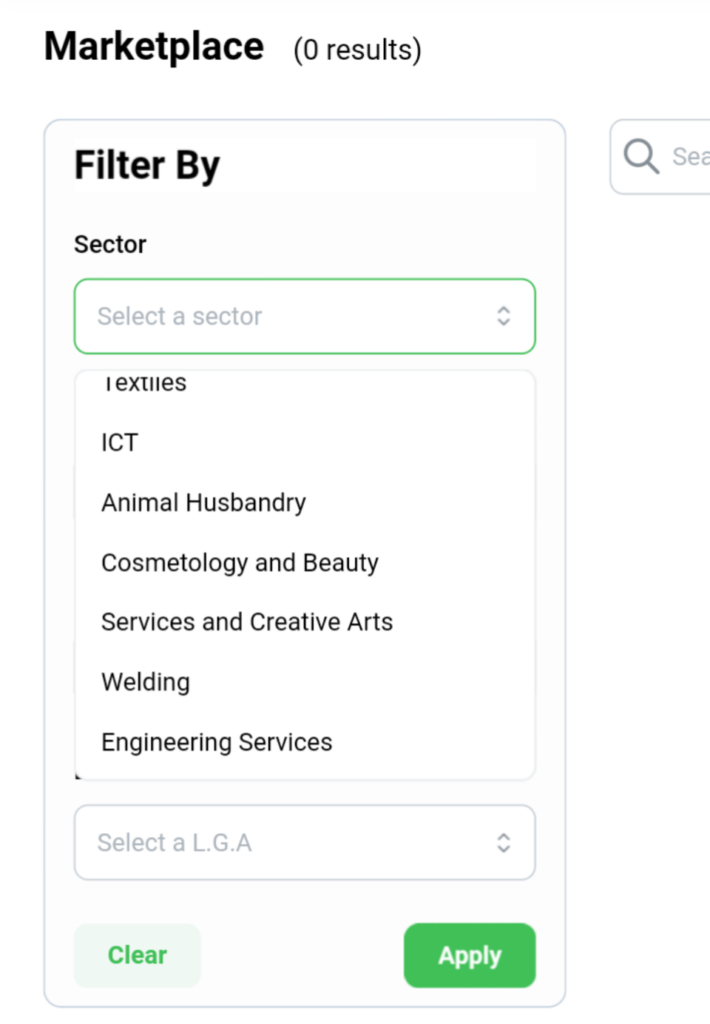This blog post explains the transformative impact of the Skill-UP Artisans (SUPA) initiative in Nigeria. From addressing the nation’s pressing unemployment challenges to empowering artisans across various industries, SUPA emerges as a pillar of hope for economic development and inclusive growth.
Introduction
Nigeria, with a population exceeding 220 million people, faces the persistent challenge of unemployment, particularly among its youth. Projections indicated a labor force increase to over 67 million in 2022, necessitating urgent measures to provide employment opportunities as more citizens enter the job market. In response to this pressing issue, President Bola Ahmed Tinubu, GCFR, under the Renewed Hope Agenda, is dedicated to creating gainful employment for the nation’s youth.
Central to President Tinubu’s vision for economic development and poverty alleviation is the empowerment of artisans and the promotion of industrial growth through a skilled workforce.
Inclusive Job Creation
While numerous employment initiatives have historically focused on the white-collar sector, Dr. Doris Uzoka-Anite, the Honourable Minister of Industry, Trade, and Investment, is spearheading a campaign targeting the blue-collar industry. This initiative aims to ensure inclusivity in the Federal Government’s job creation efforts.
Introducing SUPA Skill-UP Artisans

The Skill-UP Artisans (SUPA) program emerges as a very strong strategy in this endeavor. With a goal to impact 10 million artisans over a two-year period, SUPA represents a joint initiative between the Federal Government and the Industrial Training Fund (ITF), with coordination falling under the latter’s jurisdiction.
Addressing Global Employment Trends
SUPA aligns with evolving global employment patterns influenced by technological advancements. The traditional preference for white-collar positions has led to a scarcity of qualified Nigerian artisans. SUPA endeavors to reverse this trend by empowering artisans with the skills needed to thrive in modern industries.
Bridging the Skills Gap

The lack of a unified effort to certify and license artisans has exacerbated the skills gap, underlining the imperative to uplift unlicensed and uncertified artisans. The Federal Government’s commitment to promoting skills development among artisans reflects its dedication to establish a society characterized by shared prosperity and equal opportunities for all citizens.
The Comprehensive Approach of SUPA
SUPA represents an initiative that targets to enhance service delivery standards through the certification and licensing of artisans, thereby catalyzing the growth of small and medium-sized enterprises (SMEs). By ensuring a pool of skilled workers for domestic industries, SUPA reduces dependency on imported labor. Over a two-year span, the program aims to empower 10 million diligent Nigerians across various sectors.
Areas Covered by SUPA Initiatives

1. Building and Construction
The SUPA initiative extends its reach to the building and construction sector, recognizing the important role artisans play in infrastructure development. SUPA contributes to the advancement of this crucial industry, by equipping artisans with modern techniques and skills.
2. Hospitality, Travel, and Tourism
When it comes to hospitality, travel, and tourism, SUPA ensures that artisans possess the necessary expertise to provide top-notch services. From hotel maintenance to tourist attractions, skilled artisans enhance the overall experience for visitors and contribute to the sector’s growth.
3. Automobile
With the automobile industry being a significant driver of economic activity, SUPA focuses on enhancing the skills of artisans involved in vehicle maintenance, repair, and manufacturing. Boosting expertise in this sector, SUPA contributes to the efficiency and competitiveness of Nigeria’s automotive industry.
4. Agriculture/Agro-Processing
Agriculture and agro-processing are vital sectors for Nigeria’s economy, and SUPA recognizes the importance of skilled artisans in these fields. Artisans trained under SUPA contribute to the modernization and productivity of agricultural practices.
5. Power
In the power sector, skilled artisans are essential for the installation, maintenance, and repair of electrical infrastructure. Here, SUPA ensures that artisans possess the expertise needed to support the country’s power generation and distribution systems, thereby contributing to energy security and reliability.
6.Fashion, Leather, Apparels, and Textiles
SUPA extends its support to artisans in the fashion, leather, apparels, and textiles industries. Enhancing craftsmanship and creativity, SUPA artisans contribute to the growth of these sectors, both domestically and internationally.
7. ICT
In an increasingly digital world, ICT skills are in high demand. SUPA equips artisans with the necessary skills to thrive in areas such as computer hardware maintenance, software development, and digital marketing, thereby contributing to Nigeria’s digital economy.
8. Animal Husbandry
Animal husbandry plays a crucial role in Nigeria’s agricultural landscape, and SUPA ensures that artisans possess the skills needed for animal care, breeding, and healthcare. Giving support to the livestock industry, SUPA contributes to food security and economic growth.
9. Cosmetology and Beauty
In the cosmetology and beauty industry, skilled artisans are essential for providing services such as hairdressing, skincare, and makeup artistry. SUPA ensures that artisans in this sector receive training in modern techniques and trends, enhancing the quality of services offered.
10. Services and Creative Arts
From event planning to graphic design, artisans in the services and creative arts sector play a crucial role in providing innovative solutions and enhancing cultural expression. SUPA supports artisans in this diverse sector, fostering creativity and entrepreneurship.
11. Welding
Welding is a fundamental skill in various industries, including construction, manufacturing, and automotive. SUPA ensures that welders receive comprehensive training to meet industry standards and contribute to the development of infrastructure and machinery.
12. Engineering Services
Engineers are essential for designing and implementing solutions across multiple sectors, from civil engineering to mechanical and electrical engineering. SUPA supports artisans in engineering services, ensuring they possess the skills needed to tackle complex challenges and drive innovation.
Method of Application

Appkication for the Skill-UP Artisan is done online. Click here to begin your application https://supa.itf.gov.ng/
Conclusion
The SUPA initiative represents a very important step towards addressing Nigeria’s unemployment challenges and fostering economic development. Empowering artisans across diverse sectors, SUPA not only bridges the skills gap but also catalyzes growth and innovation. Through concerted efforts and inclusive policies, Nigeria is poised to harness the potential of its workforce and pave the way for a prosperous future.
I’m interested and I chose No. 9